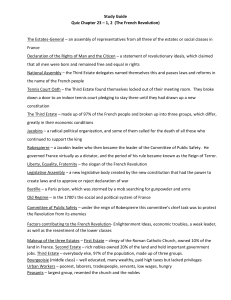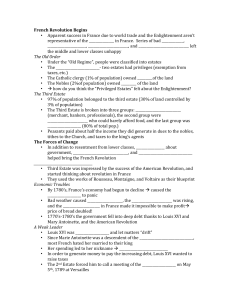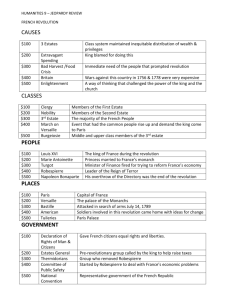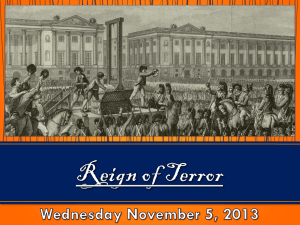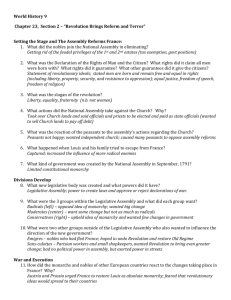Ch. 23 The French Revolution and Napoleon
advertisement
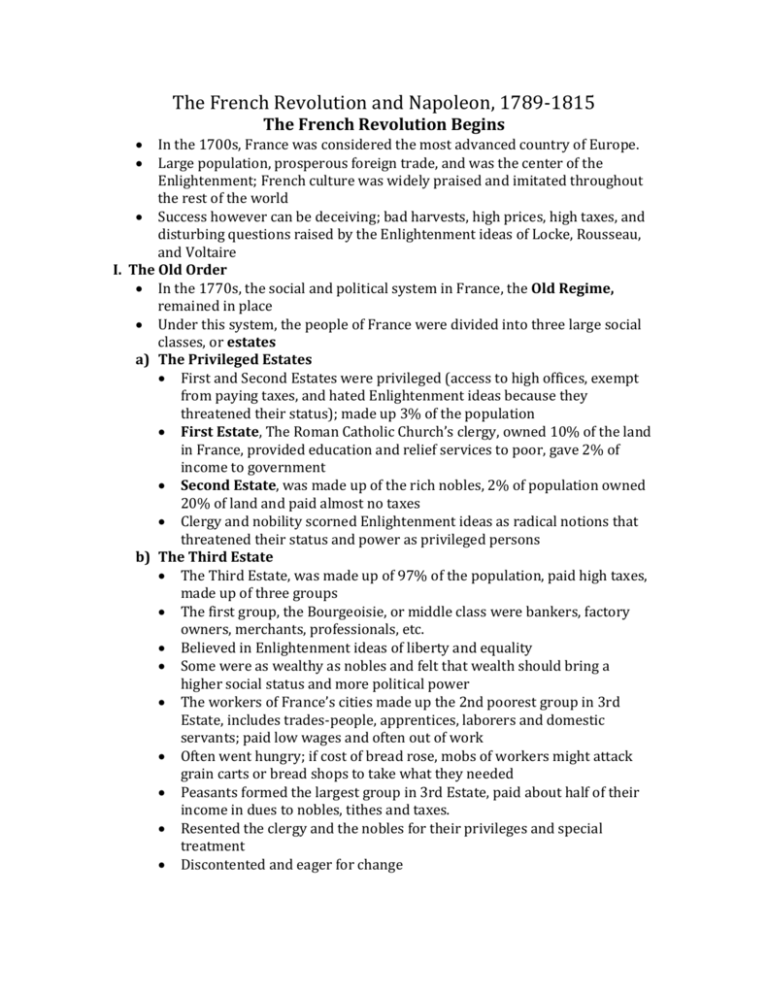
The French Revolution and Napoleon, 1789-1815 The French Revolution Begins In the 1700s, France was considered the most advanced country of Europe. Large population, prosperous foreign trade, and was the center of the Enlightenment; French culture was widely praised and imitated throughout the rest of the world Success however can be deceiving; bad harvests, high prices, high taxes, and disturbing questions raised by the Enlightenment ideas of Locke, Rousseau, and Voltaire I. The Old Order In the 1770s, the social and political system in France, the Old Regime, remained in place Under this system, the people of France were divided into three large social classes, or estates a) The Privileged Estates First and Second Estates were privileged (access to high offices, exempt from paying taxes, and hated Enlightenment ideas because they threatened their status); made up 3% of the population First Estate, The Roman Catholic Church’s clergy, owned 10% of the land in France, provided education and relief services to poor, gave 2% of income to government Second Estate, was made up of the rich nobles, 2% of population owned 20% of land and paid almost no taxes Clergy and nobility scorned Enlightenment ideas as radical notions that threatened their status and power as privileged persons b) The Third Estate The Third Estate, was made up of 97% of the population, paid high taxes, made up of three groups The first group, the Bourgeoisie, or middle class were bankers, factory owners, merchants, professionals, etc. Believed in Enlightenment ideas of liberty and equality Some were as wealthy as nobles and felt that wealth should bring a higher social status and more political power The workers of France’s cities made up the 2nd poorest group in 3rd Estate, includes trades-people, apprentices, laborers and domestic servants; paid low wages and often out of work Often went hungry; if cost of bread rose, mobs of workers might attack grain carts or bread shops to take what they needed Peasants formed the largest group in 3rd Estate, paid about half of their income in dues to nobles, tithes and taxes. Resented the clergy and the nobles for their privileges and special treatment Discontented and eager for change II. The Forces of Change Other factors besides the resentment of the lower classes led to a revolutionary mood in France 1. New ideas of government 2. Serious economic problems 3. Weak and indecisive leadership All generated a desire for change c) Enlightenment Ideas New views about power and authority in government were spreading among the Third Estate Members were inspired by the success of the American Revolution They began questioning long standing notions about the structure of society Quoting Rousseau and Voltaire, they began to demand equality, liberty, and democracy d) Economic Troubles By the 1780s, France’s once prosperous economy was in decline This caused alarm among merchants and factory owners of Third Estate Cost of living was rising rapidly, and crop failures because of bad weather caused a grain shortage and people faced starvation because the price of bread doubled in 1789 France’s government sank into debt because of extravagant spending of Louis XVI and Marie Antoinette France had large debt already because of previous kings Louis XVI borrowed a lot of money to help the American revolutionaries during the war against Great Britain; this doubled the government’s debt e) A Weak Leader Louis XVI, was indecisive and allowed matters to drift; he had paid little attention to his government advisers The queen only added to problems; she often interfered in government and often gave poor advice Louis’s solution was putting off dealing with the financial crisis until he had almost no money left, he then tried to tax the nobility However, the Second Estate forced him to call a meeting of the EstatesGeneral, an assembly of representatives from all three estates-to approve this new tax; it was held on May 5, 1789 at Versailles III. Dawn of the Revolution The clergy and the nobles had dominated the Estates-General throughout the Middle Ages and expected to do so in the 1789 meeting. Under old rules, each estate’s delegates met in a separate hall to vote; each estate had one vote; the two privileged estates could always outvote the Third Estate f) The National Assembly The Third Estate delegates, made mostly of the bourgeoisie who views had been shaped by the Enlightenment, were eager to make changes in the government Insisted that all three estates meet together and that each delegate have a vote Even though the king sided with the nobles and the old medieval rule, Third Estate delegates became more determined to wield power In a dramatic speech, Emmanuel-Joseph Sieyes suggested that the Third Estate delegates name themselves the National Assembly; to pass laws and reforms in the name of the French people On June 17, 1789, following Sieyes’ ideas, the Third Estate voted to establish the National Assembly, in effect ending absolute monarchy and beginning of a representative government. Vote was the first deliberate act of revolution Three days later, the Third Estate delegates found themselves locked out of their meeting room They broke down the door to an indoor tennis court, pledging to stay until they had drawn up a new constitution This pledge became known as the Tennis Court Oath g) Storming the Bastille In Paris, some people suggested that Louis was intent on using military force to dismiss the National Assembly Others charged that the foreign troops were coming to Paris to massacre French citizens People began to gather weapons in order to defend the city against attack On July 14, a mob searching for gunpowder and arms stormed the Bastille, a French prison After overwhelming the guards and seizing control of the prison, the attackers hacked the prison commander and guards to death and paraded around the streets with their heads on pikes The fall of the Bastille became a great symbolic act of revolution to the French people Ever since, July 14 or Bastille Day has become a French National holiday similar to the 4th of July IV. A Great Fear Sweeps France Rebellion started to spread to the countryside before long Rumors that the nobles were hiring outlaws to terrorize peasants created a wave of senseless panic known as the Great Fear Peasants soon became outlaws themselves Armed with pitchforks and other farm tools, they broke into noble’s manors to destroy old legal papers that bound them to pay feudal dues Peasants sometimes simply burned the manors down October 1789, Parisian women rioted over the rising price of bread; brandishing weapons, they marched on Versailles Demanded that National Assembly take action, then turned to the king and queen demanding that they return to Paris The king, his family, and servants left Versailles, never again to see their magnificent palace Revolution Brings Reform and Terror Peasants were not the only members of French society to feel the Great Fear; nobles and officers of the Church were equally afraid Bands of angry peasants struck out against members of the upper classes, attacking and destroying many manor houses Before the women’s march on Versailles in 1789, some nobles and clergy in the National Assembly responded to the uprisings V. The Assembly Reforms France Throughout the night of August 4, 1789, noblemen gave speeches and declarations about their love of equality and liberty Motivated by fear, not so much idealism Joined other members of the National Assembly to sweep away feudal privileges of the First and Second Estates; the Old Regime was dead a) The Rights of Man Three weeks later, the National Assembly adopted a statement of revolutionary ideals, the Declaration of the Rights of Man and of the Citizen Document stated that “men are born and remain free and equal in rights.” Rights included “liberty, property, security, and resistance to oppression.” The document also guaranteed citizens equal justice, freedom of speech, and freedom of religion Revolutionary leaders adopted the expression “Liberty, Equality, Fraternity” as their slogan However did not apply to women Olympe de Gouges published a declaration of the rights of women, she was rejected and later executed as being an enemy of the revolution b) A State Controlled Church Many early reforms focused on the Church The National Assembly took over Church lands and declared that Church officials and priests were to be elected and paid as state officials; Catholic Church lost its land and political independence Move was largely economic; proceeds from the sale of Church land helped pay off France’s huge debt This alarmed millions of French peasants, who were devout Catholics The effort to make the Church part of the state offended them; believed that pope should rule over a church independent of the state. From this time on, peasants opposed the assembly’s reforms c) Louis Tries to Escape As the relationship between Church and state was restructured, Louis XVI pondered his fate as a monarch Many advisers warned him that he and his family were in danger The royal family, seeing France as unsafe, tried to flee the country to the Austrian Netherlands in June 1791 As they neared the border, they were apprehended and returned to Paris His attempted escape increased the influence of his radical enemies in the government and sealed his fate VI. Divisions Develop For two years, the National Assembly argued over a new constitution for France By 1791, the delegates had made significant changes in France’s government and society d) A Limited Monarchy In September 1791, the National Assembly completed the new constitution, which Louis reluctantly approved This constitution created a constitutional monarchy stripping the king of much of his authority It created a new legislative body, the Legislative Assembly This body had the power to create laws, and to approve or reject declarations of war; executive power to carry out laws still lied with the king e) Factions Split France Despite the new government, old problems still remained such as food shortages and government debt The question of how to handle these problems caused the Legislative Assembly to split into three groups, each of which sat in a different section of the meeting hall Radicals, who sat on the left side of the hall, opposed the idea of a monarchy and wanted sweeping changes on the how the government was run The Moderates, sat in the center of the hall, wanted changes but not as many as the Radicals The Conservatives, sat on the right side of the hall, upheld the idea of a limited monarchy and wanted few changes to government Factions outside of the Legislative Assembly wanted to influence the direction of government as well Emigres, nobles and others who had fled France, hoped to undo the revolution and restore the Old Regime In contrast, some Parisian workers wanted the Revolution to bring even greater changes to France; they were called sans-culottes or “those without knee-breeches These people wore regular trousers, unlike the upper class VII. War and Execution Monarchs and nobles from other countries watched the changes taking place in France with alarm Feared that similar revolts might break out in their own countries Some radicals wanted to spread these revolutionary ideas throughout Europe Some countries took action Austria and Prussia, for example, urged the French to restore Louis to his position as absolute monarch Legislative Assembly responded by declaring war in April 1792 f) France at War By summer of 1792, Prussian forces were advancing on Paris The Prussian commander threatened to destroy Paris if the revolutionaries harmed any member of the royal family Enraged by this, 20,000 Parisians on August 10, invaded the Tuileries (palace). The mob massacred the royal guard and imprisoned Louis, Marie Antoinette, and their children French troops that were defending Paris were sent to reinforce the French army in the field Due to rumors spreading that imprisoned citizens were planning to break out and support the king, people began to take the law into their own hands For several days in September, prisons were raided and 1,000 prisoners were murdered; royalist sympathizers were victims during these September Massacres Under pressure from the Radicals, the Legislative Assembly set aside the Constitution of 1791 It declared the king deposed, dissolved the assembly, and called for the election of a new legislature The National Convention took office on September 21 It quickly abolished the monarchy and declared France a republic; adult, male citizens were given the right to vote g) Jacobins Take Control Most governmental changes that took place in September 1792 came from members of a radical political organization, the Jacobin Club One prominent Jacobin, Jean-Paul Marat, edited a newspaper called L’Ami du Peuple (Friend of the People) In many editorials, Marat called for the death of all those who continued to support the king Georges Danton, a lawyer, was also known for his devotion to the rights of Paris’s poor people The National Convention has reduced Louis XVI from that of king to that of a common citizen and prisoner Now guided by the radical Jacobins, it tried Louis for treason. Found guilty, the Convention sentenced him to death On January 21, 1793, the former king was beheaded by the guillotine h) The War Continues When the Convention took office, the French army won a stunning victory against the Austrians and the Prussians at the Battle of Valmy When Great Britain, Holland, and Spain joined forces with Austria and Prussia, a draft was ordered by the National Convention; 300,000 French between the age of 18-40 were ordered to fight In 1794, the army had grown to 800,000 and included women VIII. The Terror Grips France Besides foreign enemies, the Jacobins had thousands of enemies within France itself These included peasants who were horrified by the king’s execution, priests who would not accept government control, and rival leaders who were stirring up rebellion in the provinces How to contain these problems became a central issue i) Robespierre Assumes Control In early 1793, one Jacobin leader, Maximilien Robespierre, slowly gained power. Robespierre and his supporters set out to build a “republic of virtue” by wiping out traces of France’s past They changed the calendar, dividing the year into 12 months of 30 days and renaming each month; calendar had no Sundays—considered religion old fashioned and dangerous Closed all churches in Paris; cities and towns in France eventually did the same July 1793, Robespierre became leader of the Committee of Public Safety Governed France virtually as a dictator His period of rule was known as the Reign of Terror The main task of the Committee was to protect the Revolution from its enemies “Enemies” were often tried in the morning and guillotined in the afternoon Robespierre justified his use of terror by suggesting that it enabled French citizens to remain true to the ideals of the Revolution Enemies of the Revolution were often radicals who challenged Robespierre’s leadership In 1793 and 1794, many of those who had led the Revolution received death sentences Their only crime was that they were considered less radical than Robespierre. By early 1794, Georges Danton found himself in danger Danton’s own friends in the National Convention were afraid to defend him and actually joined in condemning him. Told the executioner, “Don’t forget to show my head to the people, it’s well worth seeing.” Besides Danton and Marie Antoinette, thousands of unknown people were sent to their deaths, often on the flimsiest of charges An 18 year old boy was sentenced to death for chopping down a tree that had been planted as a symbol of liberty. As many as 40,000 people were executed during “The Terror” About 85% of those were peasants and urban workers for whom the Revolution was started IX. End of the Terror In July 1794, fearing for their own safety, members of the National Convention turned against Robespierre. They demanded his arrest and execution His Reign of Terror ended on July 28, 1794, when Robespierre was sent to the guillotine French public opinion shifted greatly after Robespierre’s death. People had grown weary of the Terror Tired of skyrocketing prices for bread, salt and other necessities of life In 1795, moderate leaders in the National Convention drafted a new plan of government; the third since 1789 Power was placed firmly in the hands of the upper class and called for a twohouse legislature and an executive body of 5 men known as the directory They were moderates, not revolutionary idealists; some were corrupt and became wealthy at the country’s expense Did provide order to France; Napoleon Bonaparte chosen to command France’s army


